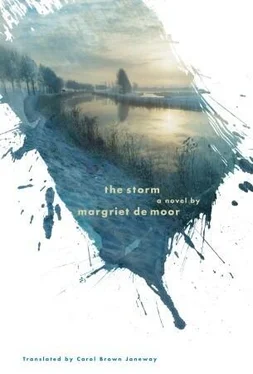Hocke nodded. He groped in his jacket pocket and handed the man his car keys.
“Okay, if you think it’s necessary.”
The other man promised to bring the car back within the hour.
She went back to her place at the table. Someone new was now sitting beside her, a tall young man with intelligent eyes fringed by pale lashes, who opened the conversation by saying, “Nothing special!” She looked at him cheerfully and laughed, as a way of easing the conversation about the sea and how it was skipping the ebb tide this evening for a change.
“Excuse me,” she said after a while and leaned toward her new table companion to ask where his predecessor had gone. She was very sleepy again and had already wondered a couple of times when she could politely head for the room where she had changed from her traveling clothes into a dress hours before and laid out her pajamas ready on the bed.
“Where is he?”
“Simon Cau?”
“Yes.”
The young man looked around. Simon Cau, he said, was the dike sheriff or superintendent of one of the large polders here, and had certainly made a quick trip to the harbor to check the water. The six o’clock news on the radio had spoken of “dangerous high tides” and that almost never happened. Dike superintendent, the highest authority on the dike, a noble office, some people took it seriously, others not at all.
“Yes,” he went on, “what kind of a person is each of us inside … hmm … you, me, all of us? Does any of us have a choice? But sometimes someone manages to be that person he wants to be deep in his heart.”
Lidy learned that Simon Cau was the last of three brothers, tenant farmers who had put their lifelong efforts into acquiring the beautiful eighteenth-century Gabriëllina Farm. Finally he had succeeded, and nobody even today had been able to work out how he had assembled the money. By saving, borrowing money, and loaning it out again, sharpening one knife against the other? Afterward he had succeeded in making it into one of the best-run businesses in the area, everything done in the most up-to-date way imaginable, except for the one instance in which he refused to go along with the times: he wouldn’t allow any tractor on the farm. He was doing mixed farming, and everything, even the binding of the corn, was done using horses. For Cau, as the young man explained, loved horses, horses were his god, and it didn’t matter what the neighbors thought, the new landowner, who had started out as a farm laborer, built a second stable right up against the house. And with a batch of old clinker he paved the area all the way from the barn doors to the road. And last: two new pedigreed mares who were given such a thick layer of straw in their stalls that after the day’s work they couldn’t resist the temptation to stretch out like dogs and lie on their sides to sleep. Even though they were heavy Belgian shire horses.
Lidy, who was listening with only half an ear, swallowed a yawn.
“Heavy horses,” she murmured, her eyes damp. “Belgian shire horses.”
And then, as if her words had conjured him back to the party, in the mirror next to the stairs that led to the upper floor, she suddenly saw Simon Cau cutting his way through the dining room. The light in the background made his figure stand out clearly: small and gray, hurrying, in an anthracite-colored coat with a cap on his head that people of his type usually take off only to hold in front of their faces while praying. Someone seized him by the arm in order to ask him something. Cau stopped, listened restlessly like a man interrupted, and shook his head several times.
Lidy, who had been feeling for some time that she was no longer awake but dreaming, got to her feet. The godchild and her brothers had already disappeared from the stage. She excused herself charmingly from Jacomina and Izak Hocke, shook hands in thanks with the grandparents and an arbitrary assortment of people, and in less than fifteen minutes was lying flat in bed under the noise of a creaking ceiling.
Deep in her sleep, despite the roar of the hurricane or perhaps because of it, as the noise had been an integral part of events, she continued the party in the hotel Winter Garden in her dreams. But when she was jerked awake by a hammering at her door, she thought she was back at home. She groped three times but couldn’t find the light switch. She recognized the voice behind the door only when she opened it—“Ah, Jacomina”—and her eyes were immediately drawn to the two men standing behind her. Everything changed in that moment, and the day, decked out with the most alarming details, forced its way back into her memory.
She waited.
It was a few days later. Armanda put on her coat in the hall of her parents’ house, then her hood, fished in the basket that stood on the table under the mirror for a pair of mittens, and for a moment, out of habit, took a hard look at herself. A minute later the front door banged shut behind her. She crossed the street to the opposite sidewalk, which ran along the side of the park. Someone had told her that the newsreel in the cinema on the Ceintuurbaan was showing the most recent updates about the floods, and she wanted to see them.
Late afternoon. Dusk was falling, making the city look dirty, as cities so easily do in winter. But the broken branches and broken roof tiles had already been cleared away.
Vaguely disturbed, she walked past a bakery, a cobbler’s workshop, and a bridal outfitter. Her unease was connected to the fact that everything seemed to be so normal again that it made one begin to wonder if the whole tumult had been necessary. It was still blowing, but not exceptionally hard, and the wet snow had stopped falling today. But the sky was as dark as it had been the previous month, too dark for the time of year. Frequently it had been misty for days at a time. The weather bureau in De Bilt had registered only twenty-five hours of sunshine for the whole of January, a record low, for which one would have had to go back all the way to the records of 1902. In addition, it had been cold. The mercury, a perpetual four degrees below normal, had signaled a winter freeze of a kind that people had forgotten in recent years.
She pushed open the door to the movie house and felt welcomed for a moment by the lights, the plush carpet, and the sense of hallucination. At the counter she asked if the show had already begun and held out a few quarter guilders. The cashier glanced sideways for a second, murmured, “In a moment,” and gave her a ticket for the parterre. An usherette led her into the darkness with a little cone of light. Just in time. The World News headline anthem sounded … and there it was, a single expanse of water, filling the screen. Unbuttoning her coat, she sank into a seat.
A drowned village, a section of broken dike, against a sound track of howling wind Armanda saw a handful of soldiers in long coats, with berets pulled down over their ears, shoveling sand into sacks. She looked at the water lapping at their boots in little waves, completely disconnected from the whistling wind in the film, and at the surface of the water with the roofs of the village poking up out of it, looking oddly calm; water that looked like a normal sea, except that one simply didn’t understand how it had got there. Soon the familiar newsreel announcer’s voice came out of the music accompanying the storm to tell her more authoritatively than any messenger in a play what she was seeing and what she was to make of it.
“Something that is more tragically familiar to our country than any other in the world.”
The picture showed groups of refugees being loaded onto buses, a herd of cows stampeding full tilt through a shopping street that had turned into a river, a cart pulled by a mournful-looking horse on which some women were sitting; the camera zoomed in so close that only one remained visible, filling the screen as she looked directly at Armanda out of another world, infinitely removed in space and time. The deaths didn’t number in the dozens, the newsreel voice continued; alas, the previous figures had to be revised, the tally was in the hundreds. This is Oude-Tonge and Overflakkee — a dirty gray picture appeared — where three hundred people lost their lives in the floods. This is ’s-Gravendeel in the Hoeksche Waard, where fifty-five people drowned. To the accompaniment of urgent music, a whole series of disaster zones now appeared, as abstract to Armanda as the names of places in ancient stories where mythical events had unfolded. Dordrecht, Willemstad, West Brabant, the Hollands Diep, they carried a message that was far beyond her grasp as they collected around a white space in her heart: she and Lidy, and their roles in a drama that had taken on a life of its own.
Читать дальше












